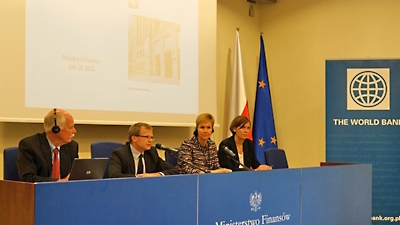![]()
WARSAW, July 18, 2013—The World Bank today launched its public sector pay practices in Poland report at the Ministry of Finance. Prepared in cooperation with the Ministry, the report reviews Poland’s system of salary setting in the public sector, and provides recommendations for improvements.
The report concludes that the Ministry of Finance has thus far been successful in containing the public sector wage bill, and that the levels of public sector salaries are – on average – adequate to attract and retain staff. However, on an individual basis, the absence of clear rules for job grading, pay setting, and promotion may hurt staff morale and, in the medium-term, the ability of the government to attract valuable employees who want to pursue a career in the public sector.
“The analysis prepared by the World Bank is a first step in evaluating the public sector pay system in Poland. In the future, apart from the civil services, we also plan to review pay setting mechanisms in government agencies and in local governments. We aim to develop a system of wage setting within the public administration, which would increase the effectiveness of the public sector as a whole,” said Ludwik Kotecki, Chief Economist of the Ministry of Finance.
The report addresses three main questions:
- Does the system succeed in controlling the aggregate wage bill?;
- Are salaries high enough to attract and retain qualified staff?; and
- Is the wage setting fair and does it motivate staff?
The report finds that the current system does succeed in controlling the aggregate wage bill. This is largely a result of the tight control that the Ministry of Finance exercises over the wage bill envelope of each ministry. Recently this has been reinforced by the European Council’s ‘Excessive Deficit Procedure’ (EDP). To comply with the EDP, the Government has imposed a comprehensive wage ‘freeze’. Once Poland meets the EDP deficit targets, however, the EDP will be withdrawn and this source of external control will no longer exist. To replace it, the Government proposes to impose its own fiscal responsibility rule, which will limit the growth of central government expenditures to the trend growth rate of GDP. Complementing this proposal, the report recommends that the Government index wages to inflation or a combination of wages and GDP.
The report also finds that, for most positions, public sector compensation tends to match private sector levels. High-level technical and managerial positions, however, tend to be underpaid relative to their private sector equivalents. At present, the public sector appears to have no difficulty attracting and retaining such staff, but that might be due to the current economic slowdown, which limits employment opportunities in the private sector. As the economy recovers, the Government may have difficulty attracting and retaining such staff, unless it increases salaries for such positions.
Although the current wage setting system does succeed in controlling the aggregate wage bill and attracting and retaining qualified staff (at least for the time being) more fundamental problems remain, according to the report. These derive from the wage setting process itself. The current system of wage setting permits the managers of individual administrative units to exercise very wide discretion over the wages of individual staff. In principle, there are advantages to this approach. Each unit manager can adapt individual salary levels to local labor market conditions and can reward high-performing staff. But this arrangement places a high degree of reliance on the ability of the unit managers to exercise such discretion fairly and systematically. Otherwise, such discretion can harm staff morale and the ability of Government to attract people who hope to pursue a career in the public sector.
To identify solutions, the report examines the wage setting practices of selected countries in the region, focusing in particular on the degree of autonomy enjoyed by managers at the lowest level of administration. Practices in these countries run the gamut from near total autonomy (e.g. Sweden) to no autonomy at all (Germany).
“The autonomous model requires certain preconditions to be in place. It took the Swedes decades to establish those preconditions. Poland may need more time. In the meantime, we suggest that Poland consider a middle ground approach, similar to that of Finland or Lithuania,” says William Dillinger, World Bank Lead Public Sector Management specialist and lead author of the report.
As a first step, the report recommends that Poland develop a rigorous job classification system which would classify positions according to their characteristics and responsibilities. Positions would then be grouped into grades, and each grade would be assigned a single wage coefficient or a narrow range of coefficients. By assigning staff within each grade to a single salary coefficient (or a narrow range) current discrepancies in pay within each agency would be reduced. And by imposing the common classification and salary scales on the entire civil service, discrepancies among agencies will be reduced.

